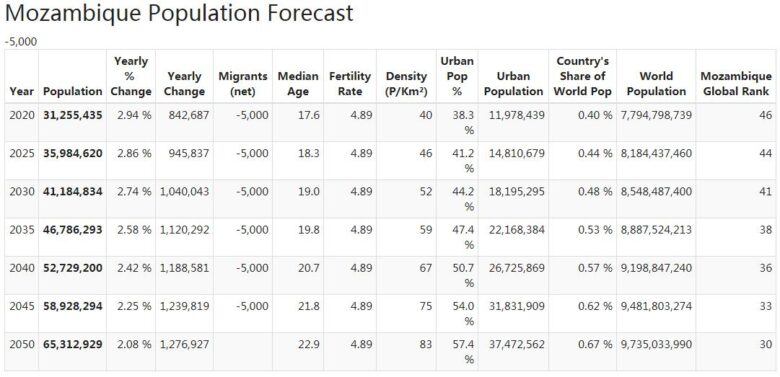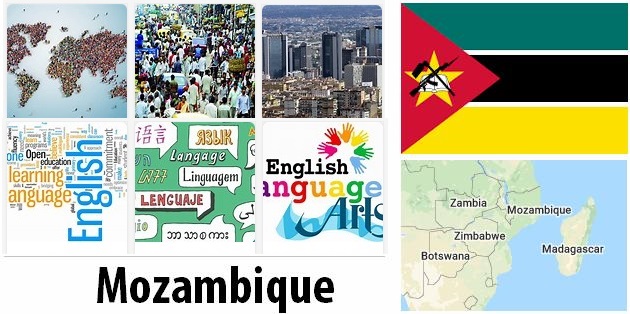Mozambique Population and Language
Ethnic and linguistic diversity is great in Mozambique. Of a dozen ethnic groups in the country, Makua-lomwe in the north is the largest and constitutes about 40 percent of the population. The second largest is the Tsonga people in the south. Another large group in the south is shona, who are majority people in neighboring Zimbabwe. All the three largest groups of people are Bantu people.
Overall, the relationship between the groups is tolerated. Although diversity has hampered the country’s cohesion, ethnic contradictions have not been a major cause of domestic political conflicts.
- COUNTRYAAH.COM: Key populations estimated size and data of Mozambique, including population density of how many people per square mile. Also included are facts for population and language.
The Zambezi River, which cuts straight through Mozambique, divides the population geographically and socially into “northerners” and “southerners”. More than half of the residents live in the north. The Norwegians are poorer and have poorer access to education and health care than the southerners, who have long dominated the ruling party Frelimo (see Political system) as well as the economy and state administration. The country’s first three presidents belonged to the tsonga people.
Mozambique has high birth rates and the population is young: around half of the population is under 15 years of age. Hunting for work has increased the emigration from Mozambique, especially to South Africa. But in recent years, migrants from neighboring countries have also illegally entered Mozambique, attracted by reports of the country’s increasing wealth and natural resources.
In order not to favor any people group, Mozambique retained the Portuguese colonial language as an official language after independence in 1975. But far from all residents can be Portuguese: in some rural areas less than 20 percent speak the language, compared to over two-thirds of residents in larger cities. Makua and tsonga are the largest of the local languages. Swahili is mainly spoken by Mozambican people on the coast.
FACTS – POPULATION AND LANGUAGE
Population
bantu peoples makua-lomwe, tsonga, shona and others
Number of residents
29,668,834 (2017)
Number of residents per square kilometer
38 (2017)
Percentage of residents in the cities
35.5 percent (2017)
Nativity / birth
39.0 per 1000 residents (2016)
Mortality / mortality
10.1 per 1000 residents (2016)
POPULATION GROWTH
2.9 percent (2017)
fertility rate
5.2 number of children born per woman (2016)
Percentage of women
51.2 percent (2017)
Life expectancy
58 years (2016)
Life expectancy for women
60 years (2016)
Life expectancy for men
56 years (2016)
Language
Portuguese is the official language, some 20 local languages (of which Makua and Tsonga are the largest), Swahili is spoken on the coast
2013
November
Frelimo wins local elections
More than 40 people are injured when police and activists gather at a meeting organized by the opposition party MDM ahead of local elections to be held throughout the country. However, the election day will be calm. The Frelimo government wins big but MDM wins terrain as Renamo boycots the election.
Rebels perform new attack
A week later, people suspected of being rebels are launching a new attack on the road. One person is killed and ten injured.
8 deaths in the clashes
Local media in the central part of the country say that eight people were killed in occasional clashes between Renamorebells and government soldiers. Some of the victims are civilians who lost their lives when their vehicles were attacked by rebels on the highway in the area.
October
The peace agreement expires after the attack
Government forces occupy Renamo’s headquarters in the jungle following an attack on an army posting. Dhlakama manages to escape. Renamo responds by attacking a police station and unilaterally canceling the 1992 peace agreement but does not immediately withdraw its members in Parliament. The events are provoking concern over the escalation of the fighting between the government and Renamo.
September
Communication is locked between the parties
The deadlock in the dialogue between the government and the rebels remains. The renamol leader Dhlakama refuses to leave his base in the jungle and travel to the capital for talks. He says he fears for his life.
Renamo accuses government forces
Renamo claims that government forces are kidnapping, torturing and executing the group’s members in the province of Sofala in the central part of the country. The information is denied by Sofala police, but residents in the area say it is not uncommon for opposition people to disappear.
August
Government’s words against Renamos
Renamo states that the group killed 36 government soldiers and police in two different firefights in the Sofia province. The data is rejected by the government, which claims that only one person lost their lives.
July
The president announces elections
President Armando Guebuza announces presidential, parliamentary and regional elections until October 2014.
June
The population demonstrates for peace
A few days later, armed men attack a number of civilian cars traveling on the north-south highway in the central part of the country. Two people lose their lives and five are injured. That attack is also blamed on Renamo. The incident leads to major national demonstrations for peace while government forces attack and burn down a camp set up by former Renamo soldiers near the main road.
Six die in armed coup
In the middle of the month, six people are killed when armed men attack a supply of weapons and seize large numbers of weapons. The authorities blame the deed on Renamo who refuses to have anything to do with the matter.
New threats from Renamo
Renamo states that the movement intends to launch a sabotage campaign and stop traffic on important roads and railways to put pressure behind its demands.
May
The Chairman of the Election Commission resigns
The president of the Election Commission resigns after he has been caught in public wearing a T-shirt and baseball cap with advertising for the Frelimo government party. The government has long been accused of politicizing public administration.
April
Renamo storms police station
At least five people are killed and ten others injured when Renamo attacks a police station in the city of Muxungue. The attack is said to be a revenge for police intervening earlier this week against two Renamo rallies. According to the police, it must have been military training in order to destabilize the country. Renamo intends to boycott the elections scheduled for November.




